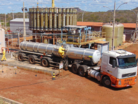Production starts at Brazil Piauí Nickel Project

Privately held UK company Brazilian Nickel has announced nickel production has begun from the Piauí Nickel Project following an 18-month construction and commissioning period.
The initial production from the PNP1000 will ramp up to produce 1,400tpa of nickel with higher production rates targeted in future.
The Piauí Nickel Project is an advanced-staged battery metals project. The key environmental permits (Licenças Previas) have been awarded for the larger scale project which envisages production of the same nickel and cobalt hydroxide products. These will supply the expected surge in demand for these metals in, among others, electric vehicle batteries, over the coming years.
Piauí Nickel Project highlights
- First nickel produced at the PNP1000 operation
- Annual production guidance from PNP1000 for 2022 of 300 tonnes of nickel and 3 tonnes of cobalt
- Anticipated annual production guidance from 2023 for PNP1000 of 1,400 tonnes of nickel and 35 tonnes of cobalt
- The PNP1000 operation will provide 215 jobs which have been filled by the residents of the local communities for over 70% of the positions.
CEO Mike Oxley said although it is only a nine-year-old junior mining company, with a small team and budget, it has successfully put the PNP1000 into operation.
"The production of nickel and cobalt at PNP1000 is a great achievement, "he said. "We are particularly proud to be bringing online a new stream of critical metals in this current environment where there is a growing need for a secure supply of nickel and cobalt which is required in green technologies, such as electric vehicles and solar panels."
Anne Oxley, Technical Director, said it marked a huge step for Brazilian Nickel as it becomes a nickel laterite heap leach producer.
"Producing nickel in NHP from our low carbon process will help the planet’s race to combat climate change," she said. "The product will feed the ever growing demand from electric vehicles."
The knowledge and skills that have been developed over this process will be invaluable to the final delivery of the larger PNP operation. Production at PNP1000 will further develop the skills of our team and capabilities of our systems and processes.
In 2016 and 2017 Brazilian Nickel successfully demonstrated large scale heap leaching, purification and recovery of nickel and cobalt from Piaui ore. The Company has expanded the existing demonstration plant to develop the PNP1000 operation. First production of nickel has been achieved at the operation, a major milestone for the Company.
Further work is to be completed on the cobalt circuit over the next four to six months. As there is much less cobalt in the ore than nickel, it takes some time for cobalt tenors in solution to reach the required levels for Cobalt Hydroxide Production (CHP) to begin. A further announcement on the commencement of CHP production is expected later this year.
During the construction phase of the PNP1000 operation the Company has held regular meetings with key local stakeholders and leaders that developed a training course scheme that was offered to 120 local participants, of which 80 have been hired for PNP1000 operations.
The PNP1000 operation will help establish and develop the downstream marketing of Brazilian Nickel’s products. The Company will also continue to seek opportunities to further reduce CO2 emissions at the project.
The Brazilian Government instituted the Policy for Supporting the Environmental Licensing of Investment Projects for the Production of Strategic Minerals through Decree No. 10,657, effective March 24, 2021. The Strategic Minerals Policy is aimed at prioritising development of mineral projects that are strategic for Brazil's growth.
In May Brazil's Nickel Ore exports accounted up to $73.9mn and imports accounted up to $601,000, resulting in a positive trade balance of $73.3mn, according to OEC data.
Last month Vale concluded the prefeasibility study for a proposed nickel sulphate project in Quebec, Canada, highlighting Vale's focus on delivering low carbon and high-purity nickel products into the growing electric vehicle industry.
Based on feasibility work to date, the project would have annual capacity to process 25,000 tonnes of contained nickel into nickel sulphate.
